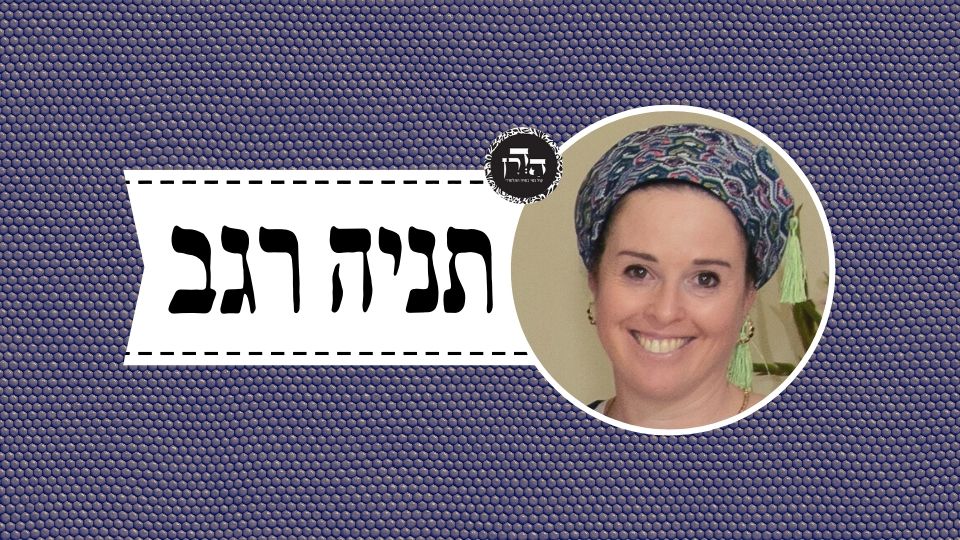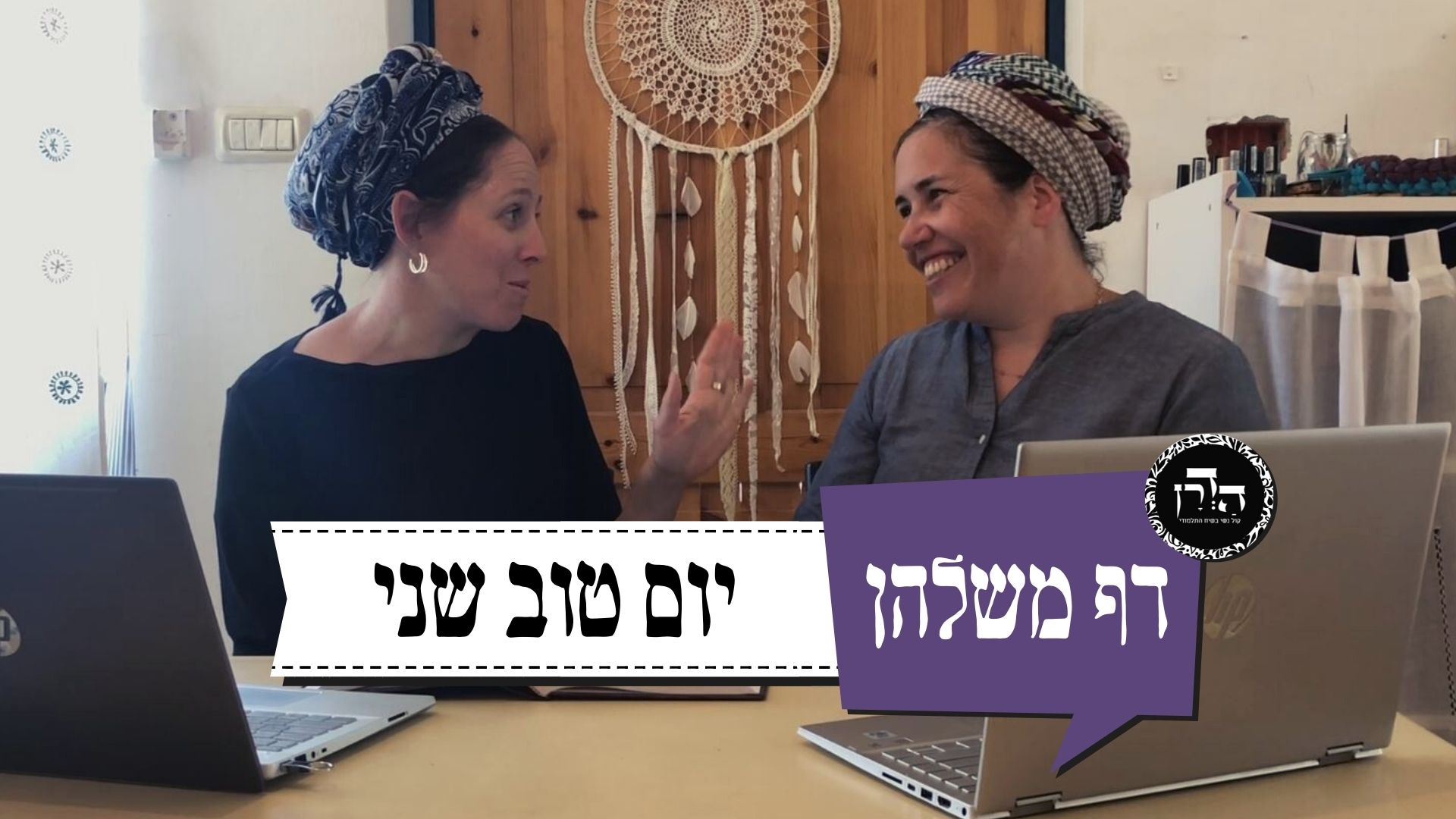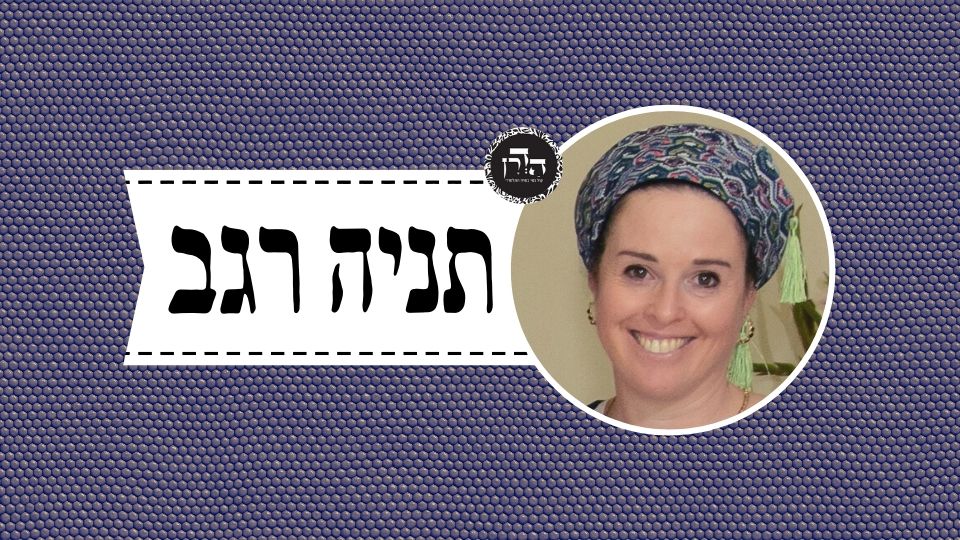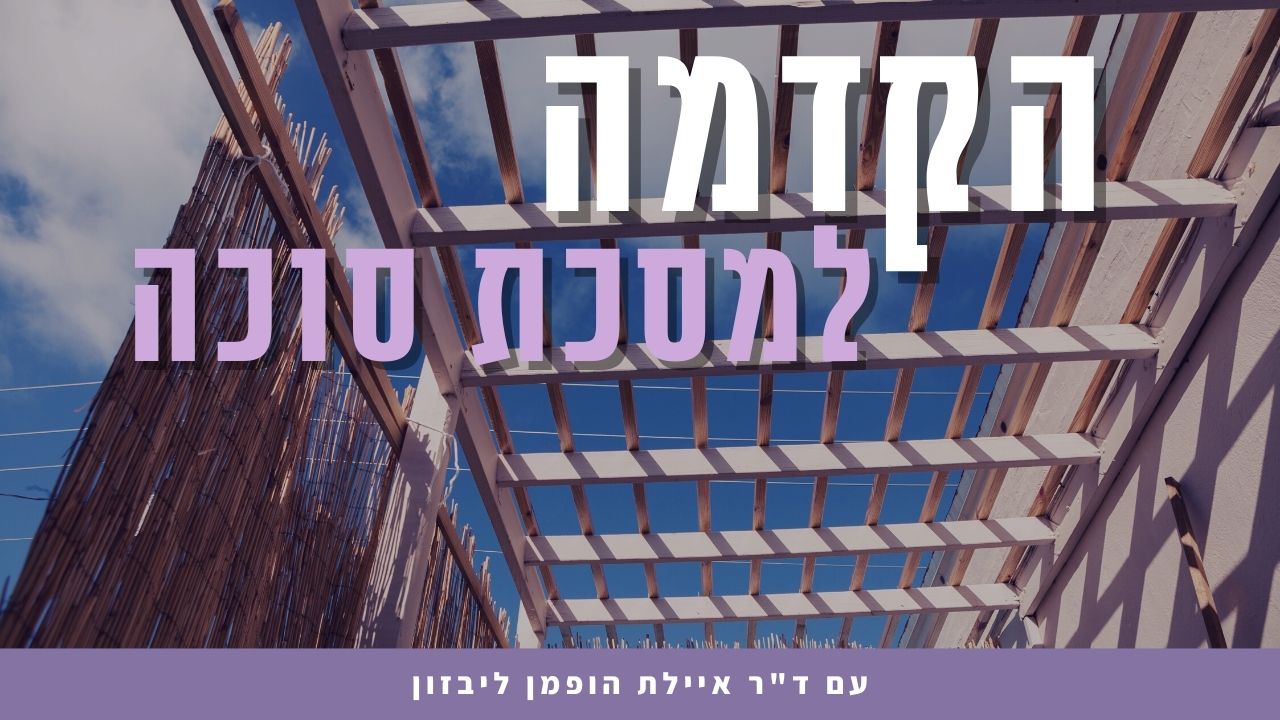סוכה כג
זֶה הַכְּלָל: כׇּל שֶׁיִּנָּטֵל הָאִילָן וִיכוֹלָה לַעֲמוֹד בִּפְנֵי עַצְמָהּ — כְּשֵׁרָה וְעוֹלִין לָהּ בְּיוֹם טוֹב.
The mishna summarizes that this is the principle: Any case where, were the tree removed, the sukka would be able to remain standing in and of itself, it is fit, and one may ascend and enter it on the Festival, since the tree is not its primary support.
גְּמָ׳ מַנִּי מַתְנִיתִין — רַבִּי עֲקִיבָא הִיא. דְּתַנְיָא: הָעוֹשֶׂה סוּכָּתוֹ בְּרֹאשׁ הַסְּפִינָה — רַבָּן גַּמְלִיאֵל פּוֹסֵל, וְרַבִּי עֲקִיבָא מַכְשִׁיר.
GEMARA: The Gemara comments: In accordance with whose opinion is the mishna? It is in accordance with the opinion of Rabbi Akiva, as it is taught in a baraita: In the case of one who establishes his sukka at the top of the ship, Rabban Gamliel deems it unfit and Rabbi Akiva deems it fit.
מַעֲשֶׂה בְּרַבָּן גַּמְלִיאֵל וְרַבִּי עֲקִיבָא שֶׁהָיוּ בָּאִין בִּסְפִינָה, עָמַד רַבִּי עֲקִיבָא וְעָשָׂה סוּכָּה בְּרֹאשׁ הַסְּפִינָה. לְמָחָר נָשְׁבָה רוּחַ וַעֲקָרַתָּה. אָמַר לוֹ רַבָּן גַּמְלִיאֵל: עֲקִיבָא! הֵיכָן סוּכָּתְךָ?
There was an incident involving Rabban Gamliel and Rabbi Akiva, who were coming on a ship. Rabbi Akiva arose and established a sukka at the top of the ship. The next day the wind blew and uprooted it. Rabban Gamliel said to him: Akiva, where is your sukka? It was unfit from the start.
אָמַר אַבָּיֵי: דְּכוּלֵּי עָלְמָא, הֵיכָא דְּאֵינָהּ יְכוֹלָה לַעֲמוֹד בְּרוּחַ מְצוּיָה דְּיַבָּשָׁה — לֹא כְּלוּם הִיא. יְכוֹלָה לַעֲמוֹד בְּשֶׁאֵינָהּ מְצוּיָה דְּיַבָּשָׁה, כּוּלֵּי עָלְמָא לָא פְּלִיגִי דִּכְשֵׁרָה. כִּי פְּלִיגִי בְּדִיכוֹלָה לַעֲמוֹד בְּרוּחַ מְצוּיָה דְּיַבָּשָׁה וְאֵינָהּ יְכוֹלָה לַעֲמוֹד (בְּרוּחַ שֶׁאֵינָהּ מְצוּיָה דְּיַבָּשָׁה). רַבָּן גַּמְלִיאֵל סָבַר: סוּכָּה דִּירַת קֶבַע בָּעֵינַן, וְכֵיוָן דְּאֵינָהּ יְכוֹלָה לַעֲמוֹד בְּרוּחַ מְצוּיָה דְּיָם — לֹא כְּלוּם הִיא. רַבִּי עֲקִיבָא סָבַר: סוּכָּה דִּירַת עֲרַאי בָּעֵינַן, וְכֵיוָן דִּיכוֹלָה לַעֲמוֹד בְּרוּחַ מְצוּיָה דְּיַבָּשָׁה — כְּשֵׁרָה.
Abaye said: Everyone agrees that in a case where the sukka is unable to withstand a typical land wind, the sukka is of no consequence and it is not even a temporary residence. If it is able to withstand even an atypical land wind, everyone agrees that the sukka is fit. Where they disagree is in a case where the sukka is able to withstand a typical land wind but is unable to withstand an atypical land wind, which is the equivalent of a typical sea wind. Rabban Gamliel holds: In order to fulfill the mitzva of sukka, we require a permanent residence, and since it is not able to withstand an atypical land wind, which is like a typical sea wind, it is of no consequence and is not a sukka at all. Rabbi Akiva holds: In order to fulfill the mitzva of sukka, we require a temporary residence, and since it is able to withstand a typical land wind, it is fit, although it is unable to withstand a typical sea wind.
אוֹ עַל גַּבֵּי גָּמָל כּוּ׳. מַתְנִיתִין מַנִּי — רַבִּי מֵאִיר הִיא. דְּתַנְיָא: הָעוֹשֶׂה סוּכָּתוֹ עַל גַּבֵּי בְּהֵמָה — רַבִּי מֵאִיר מַכְשִׁיר, וְרַבִּי יְהוּדָה פּוֹסֵל. מַאי טַעְמֵיהּ דְּרַבִּי יְהוּדָה? אָמַר קְרָא: ״חַג הַסּוּכּוֹת תַּעֲשֶׂה לְךָ שִׁבְעַת יָמִים״. סוּכָּה הָרְאוּיָה לְשִׁבְעָה — שְׁמָהּ סוּכָּה. סוּכָּה שֶׁאֵינָהּ רְאוּיָה לְשִׁבְעָה — לֹא שְׁמָהּ סוּכָּה.
§ The mishna continues: Or if one establishes his sukka atop a camel, the sukka is fit. The Gemara asks: Who is the tanna of the mishna? It is in accordance with the opinion of Rabbi Meir, as it is taught in a baraita: In the case of one who establishes his sukka atop an animal, Rabbi Meir deems it fit and Rabbi Yehuda deems it unfit. The Gemara asks: What is the rationale for the opinion of Rabbi Yehuda? The Gemara answers that it is as the verse states: “You shall prepare for yourself the festival of Sukkot for seven days” (Deuteronomy 16:13), from which Rabbi Yehuda derives: A sukka that is suitable for seven days is called a sukka, while a sukka that is not suitable for seven days is not called a sukka. It is prohibited to climb upon an animal on the first day of the festival of Sukkot, and therefore a sukka atop an animal is unfit, as it cannot be used all seven days.
וְרַבִּי מֵאִיר, הָא נָמֵי — מִדְּאוֹרָיְיתָא מִחְזֵא חַזְיָא, וְרַבָּנַן הוּא דִּגְזַרוּ בַּהּ.
And Rabbi Meir, who holds that the sukka is fit, would say: By Torah law, this sukka is also suitable for use on a Festival and on Shabbat, as there is no Torah prohibition against using an animal on those days, and it is the Sages who issued a decree prohibiting it. The fact that it is prohibited by rabbinic decree does not render the sukka unfit.
עֲשָׂאָהּ לִבְהֵמָה דּוֹפֶן לְסוּכָּה — רַבִּי מֵאִיר פּוֹסֵל וְרַבִּי יְהוּדָה מַכְשִׁיר. שֶׁהָיָה רַבִּי מֵאִיר אוֹמֵר: כׇּל דָּבָר שֶׁיֵּשׁ בּוֹ רוּחַ חַיִּים, אֵין עוֹשִׂין אוֹתוֹ לֹא דּוֹפֶן לְסוּכָּה, וְלֹא לֶחִי לְמָבוֹי, וְלֹא פַּסִּין לְבֵירָאוֹת, וְלֹא גּוֹלֵל לְקֶבֶר. מִשּׁוּם רַבִּי יוֹסֵי הַגְּלִילִי אָמְרוּ: אַף אֵין כּוֹתְבִין עָלָיו גִּיטֵּי נָשִׁים.
However, if one utilized his animal as a wall for a sukka and did not establish the entire sukka atop the animal, Rabbi Meir deems it unfit and Rabbi Yehuda deems it fit, as Rabbi Meir would say: With regard to any animate object, one may neither establish it as a wall for the sukka, nor as a side post placed at the entrance to an alleyway to render it permitted to carry in the alleyway on Shabbat, nor as one of the upright boards placed around wells to render the area a private domain and permit one to draw water from the well on Shabbat, nor as the covering for a grave. In the name of Rabbi Yosei HaGelili the Sages said: Nor may one write bills of divorce on it.
מַאי טַעְמֵיהּ דְּרַבִּי מֵאִיר? אַבָּיֵי אָמַר: שֶׁמָּא תָּמוּת. רַבִּי זֵירָא אָמַר: שֶׁמָּא תִּבְרַח. בְּפִיל קָשׁוּר כּוּלֵּי עָלְמָא לָא פְּלִיגִי, דְּאִי נָמֵי מָיֵית — יֵשׁ בְּנִבְלָתוֹ עֲשָׂרָה. כִּי פְּלִיגִי בְּפִיל שֶׁאֵינוֹ קָשׁוּר. לְמַאן דְּאָמַר שֶׁמָּא תָּמוּת — לָא חָיְישִׁינַן. לְמַאן דְּאָמַר גְּזֵרָה שֶׁמָּא תִּבְרַח — חָיְישִׁינַן.
The Gemara asks: What is the rationale for the opinion of Rabbi Meir, who rules that an animal is unfit for use as a partition in areas of halakha where a partition is required? Abaye said: It is due to the concern lest the animal die, leaving the sukka without a wall. Rabbi Zeira said: It is due to the concern lest it flee. The Gemara explains the practical halakhic differences between the two opinions. In the case where one established a wall with a tied elephant, everyone agrees that the sukka is fit, as even if it dies and falls, its carcass still has a height of ten handbreadths and is fit for the wall of a sukka. Where they disagree is in the case of an elephant that is not tied. According to the one who said: It is due to the concern lest the animal die, we are not concerned in this case, as the carcass would remain a fit wall. According to the one who said: It is due to a decree lest it flee, we remain concerned.
לְמַאן דְּאָמַר גְּזֵרָה שֶׁמָּא תָּמוּת, נֵיחוּשׁ שֶׁמָּא תִּבְרַח! אֶלָּא: בְּפִיל שֶׁאֵינוֹ קָשׁוּר, כּוּלֵּי עָלְמָא לָא פְלִיגִי. כִּי פְלִיגִי בִּבְהֵמָה קְשׁוּרָה. לְמַאן דְּאָמַר גְּזֵרָה שֶׁמָּא תָּמוּת — חָיְישִׁינַן. וּלְמַאן דְּאָמַר גְּזֵרָה שֶׁמָּא תִּבְרַח — לָא חָיְישִׁינַן.
The Gemara asks: According to the one who said: It is due to a decree lest it die, let us also be concerned lest it flee, as that too is a reasonable concern. Rather, this is the explanation: In the case where one established a wall with an elephant that is not tied, everyone agrees that the sukka is unfit lest it flee. Where they disagree is in the case of a tied animal. According to the one who said: It is due to a decree lest the animal die, we are concerned, as although it cannot flee, it might die, and the carcass of a typical animal is not ten handbreadths high. And according to the one who said: It is due to a decree lest it flee, we are not concerned.
וּמַאן דְּאָמַר גְּזֵרָה שֶׁמָּא תִּבְרַח, נֵיחוּשׁ שֶׁמָּא תָּמוּת? מִיתָה לָא שְׁכִיחָא. וְהָאִיכָּא רַוְוחָא דְּבֵינֵי בֵּינֵי? דְּעָבֵיד לֵיהּ בְּהוּצָא וְדַפְנָא.
The Gemara asks: And according to the one who said: It is due to a decree lest it flee, let us also be concerned lest it die. The Gemara answers: That is not a concern because death is not common. The Sages do not issue decrees with regard to uncommon circumstances. The Gemara asks: But according to all opinions, isn’t there the space between its legs, which is like a breach in a wall? How can one establish a partition whose breached segment exceeds its standing segment? The Gemara answers: He establishes a partition for it by filling the gaps with hard palm leaves and laurel leaves, sealing the breach.
וְדִלְמָא רָבְעָה? דִּמְתִיחָה בְּאַשְׁלֵי מִלְּעֵיל. וּלְמַאן דְּאָמַר גְּזֵרָה שֶׁמָּא תָּמוּת נָמֵי, הָא מְתִיחָה בְּאַשְׁלֵי מִלְּעֵיל! זִמְנִין דְּמוֹקֵים בְּפָחוֹת מִשְּׁלֹשָׁה סָמוּךְ לַסְּכָךְ,
The Gemara asks further: And even though there is no concern lest the animal die, perhaps it will crouch, leaving a wall that is less than ten handbreadths? The Gemara answers: It is referring to a case where the animal is tied with ropes from above so that it cannot crouch. Based on that explanation, the Gemara asks: And according to the one who said: It is due to a decree lest it die, there is also no concern since it is tied with ropes from above. Even if the animal died, it would remain in place as a fit partition. The Gemara answers: Sometimes the ten-handbreadth wall consists of the animal that is a bit higher than seven handbreadths established adjacent to the roofing, less than three handbreadths away.
וְכֵיוָן דְּמָיְיתָא — כָּוְוצָא וְלָאו אַדַּעְתֵּיהּ.
And once it dies, it contracts to be more than three handbreadths from the roofing, and it does not enter his mind to fix it because it is not noticeable. In that case, the principle of lavud would not apply, and the result would be a wall that is less than the minimum requisite height.
וּמִי אָמַר אַבָּיֵי רַבִּי מֵאִיר חָיֵישׁ לְמִיתָה וְרַבִּי יְהוּדָה לָא חָיֵישׁ? וְהָתְנַן: בַּת יִשְׂרָאֵל שֶׁנִּשֵּׂאת לְכֹהֵן וְהָלַךְ בַּעְלָהּ לִמְדִינַת הַיָּם — אוֹכֶלֶת בִּתְרוּמָה, בְּחֶזְקַת שֶׁהוּא קַיָּים.
The Gemara asks: And did Abaye actually say that Rabbi Meir is concerned about potential death with regard to the sukka walls and that Rabbi Yehuda is not concerned? Didn’t we learn in a mishna: With regard to the daughter of an Israelite who married a priest and her husband went to a country overseas, she may continue to partake of teruma as the wife of a priest, as the presumptive status of her husband is that he is alive? Apparently, in the absence of evidence to the contrary, the presumption is that one who is alive remains alive.
וְרָמֵינַן עֲלַהּ: הֲרֵי זֶה גִּיטִּיךְ שָׁעָה אַחַת קוֹדֶם מִיתָתִי — אֲסוּרָה לֶאֱכוֹל בִּתְרוּמָה מִיָּד!
And we raised a contradiction from a different mishna: If one is leaving his place of residence, and in order to preclude a situation where his wife would have the status of a deserted wife he gives her a conditional bill of divorce and stipulates: This is your bill of divorce that will take effect one hour prior to my death, it is prohibited for her to partake of teruma immediately due to the concern lest he die in the next hour. Apparently, there is concern lest one die at any point.
וְאָמַר אַבָּיֵי, לָא קַשְׁיָא: הָא רַבִּי מֵאִיר דְּלָא חָיֵישׁ לְמִיתָה, הָא רַבִּי יְהוּדָה דְּחָיֵישׁ לְמִיתָה.
And Abaye said in resolving the contradiction: This is not difficult. This mishna, where the presumption is that one who is alive remains alive, is in accordance with the opinion of Rabbi Meir, who is not concerned about potential death. That mishna, where there is concern lest one die at any point, is in accordance with the opinion of Rabbi Yehuda, who is concerned about potential death.
דְּתַנְיָא: הַלּוֹקֵחַ יַיִן מִבֵּין הַכּוּתִים, אוֹמֵר: שְׁנֵי לוּגִּין שֶׁאֲנִי עָתִיד לְהַפְרִישׁ הֲרֵי הֵן תְּרוּמָה, עֲשָׂרָה מַעֲשֵׂר רִאשׁוֹן, תִּשְׁעָה מַעֲשֵׂר שֵׁנִי, וּמֵיחֵל וְשׁוֹתֶה מִיָּד, דִּבְרֵי רַבִּי מֵאִיר.
The Gemara cites proof that these are the opinions of those tanna’im. As it is taught in a baraita: In the case of one who purchases wine from among the Samaritans and there is reason to suspect that teruma and tithes were not taken, and he is not in a position to separate teruma, he acts as follows. If there are one hundred log of wine in the barrels, he says: Two log that I will separate in the future are teruma, as the mandated average measure of teruma is one-fiftieth; ten log are first tithe; and a tenth of the remainder, which is nine log, are second tithe. And he deconsecrates the second tithe that he will separate in the future, transferring its sanctity to money, and he may drink the wine immediately, relying on the separation that he will perform later. This is the statement of Rabbi Meir.



































